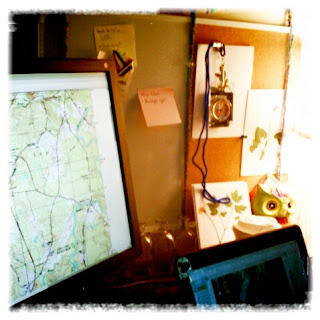
I have been working on my bachelor's degree since the fall of 2004. For the past few years, I laughed whenever someone asked when I expect to graduate. That's what happens when you bounce around to three different schools to dabble in five different majors. It has been a long and winding road, but I think I can finally see the cap and gown somewhere up ahead.
This time next year, I should have that lovely piece of paper. I can't wait.
That doesn't mean that it's all downhill from here. There is still work to be done. Lots of it, actually. The biggest piece is my senior capstone project: a field study in agroecology.
I hit the ground running in January once spring term started. February was devoted to cranking out a research proposal while squeaking by in my other courses. I received a grant for my project and began counting down the days until my research officially began.
Now, I'm counting down the days until it is over. (Cue the sad trombone.)
Anyone who does research can tell you that it's never as simple or easy as you want it to be. The natural world does not organize itself to fit into the little box of your research topic.
Stuck in the mud
As an undergraduate researcher in a new program, it seemed like I am often caught between knowing too little and expecting too much of my research. I have aced the exams, but applying that knowledge to research is a whole other game. I believed it would be a breeze.. some hard work, sure, but straightforward and manageable. Skipping over the boring details, suffice it to say that I was wrong. Very wrong.
Field research in particular is tricky, because nature tends to just do what it wants. Mother Nature doesn't care about your moist-eyed hopes and dreams. She will throw you into the thornbushes just to see you cry. Methods don't work, data is limited, sampling schemes change.. all because you don't know what you're dealing with until you're out there. Only when you are soaked with sweat, up to your ankles in mud, battling through thickets of Multiflora Rose do you realize that you're getting eaten alive by mosquitoes.. and your own doubts.
When nameless terrors attack
Even when things have been just dandy, several mornings have greeted me with anchor-arms and a lead stomach. Sometimes sleep just doesn't come. For weeks, I hit a wall of sheer anxiety. Sometimes words formed in my head that gave a vague reason for my unease, but mostly it was a paralyzing, nameless fear. The hardest thing was to keep telling myself that the easiest way through it was forward. I couldn't quit.
Now, things are getting better. Each day brings me one step closer to my goals, even if I just want to be done already. The anxiety has mostly receded, and I can take the time to enjoy a sunny day out in a pasture.
Lessons learned: First and foremost, just keep swimming!
No matter how many times you read Krebs' Rules for Ecological Research, you can be sure that you will run into problems. You will learn what it is to be flexible. Your research will change and evolve. You will stress out about everything. Just keep going.
Be creative!
Just because you collect the wrong data or can't draw conclusions from your study doesn't mean your time is wasted. Find a way for your work to still have meaning for others.
Be proud of what you're doing.
You are taking ownership for your own learning. Even if you feel like your study is a complete failure, you're in good company. Scientific discovery is built on mountains of failed experiments. Excellence comes more easily with experience, and you are on your way there.
Share your story
Our greatest moments can come from these kinds of struggles. Have you had any similar experiences? What lessons have you learned?

